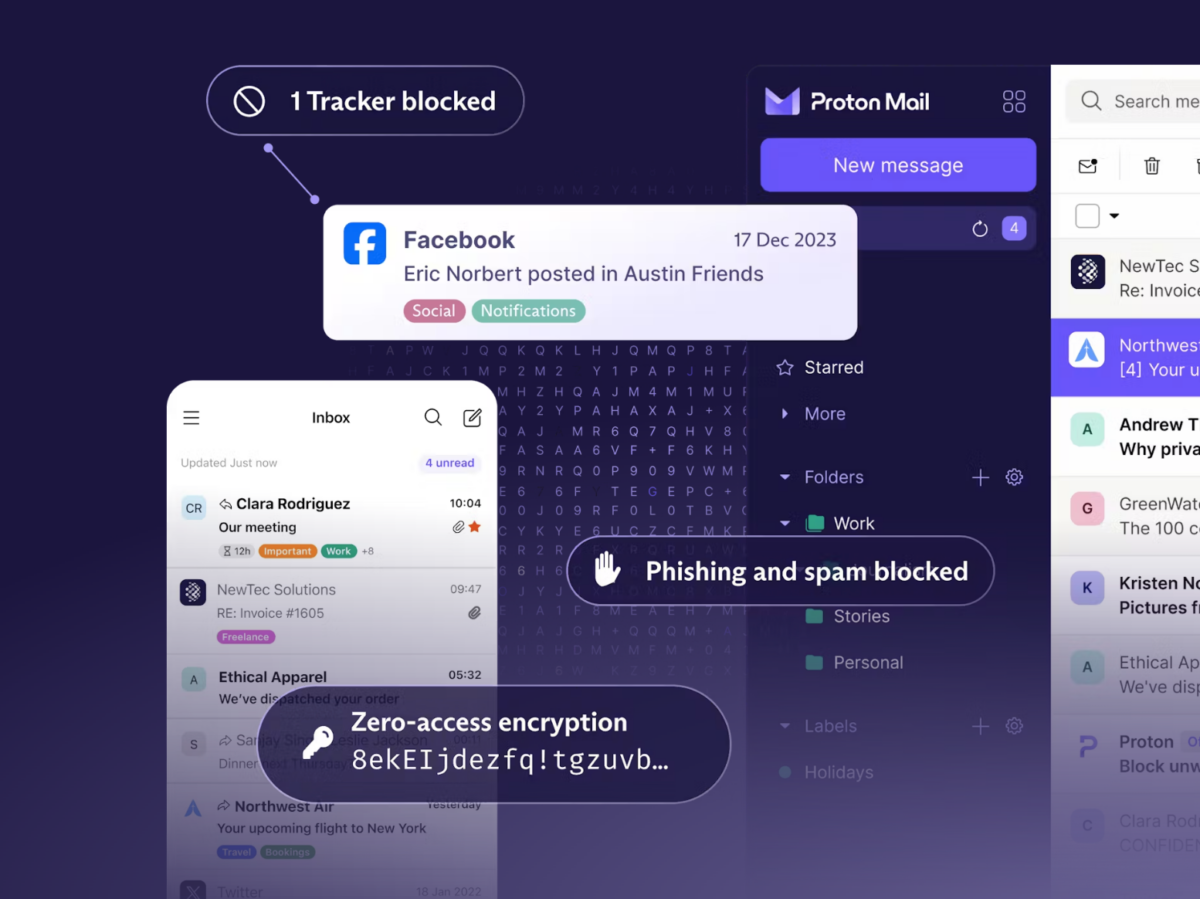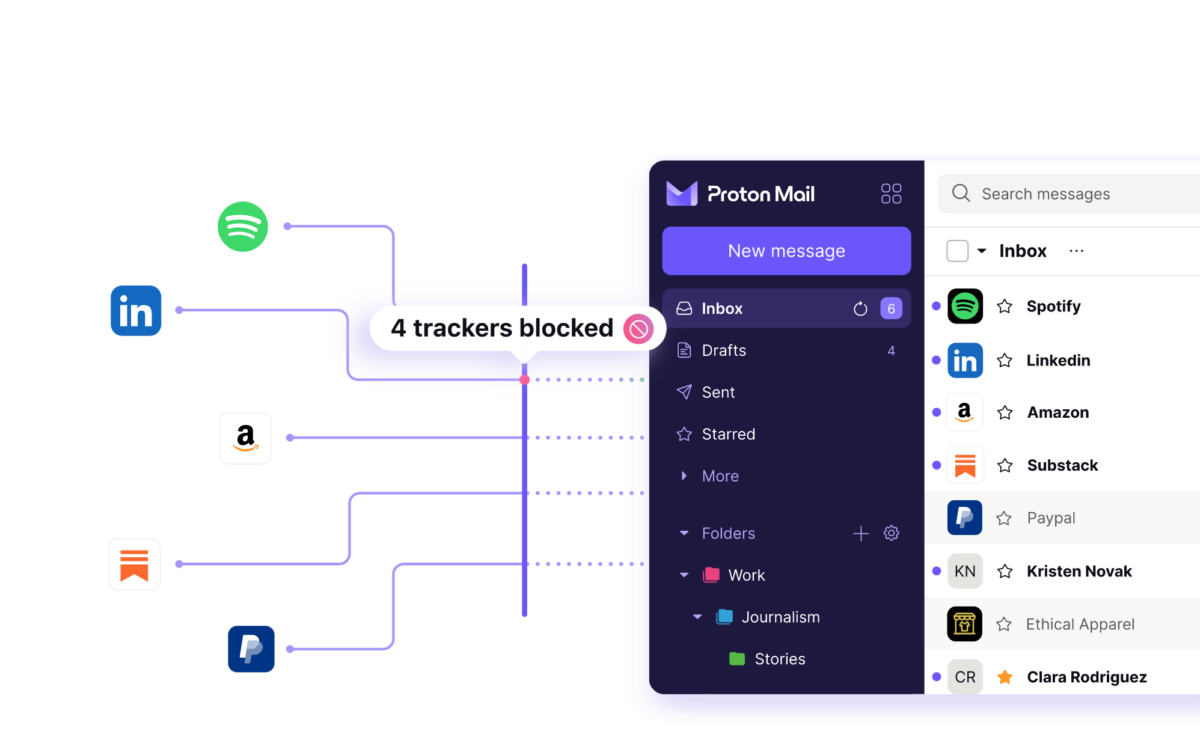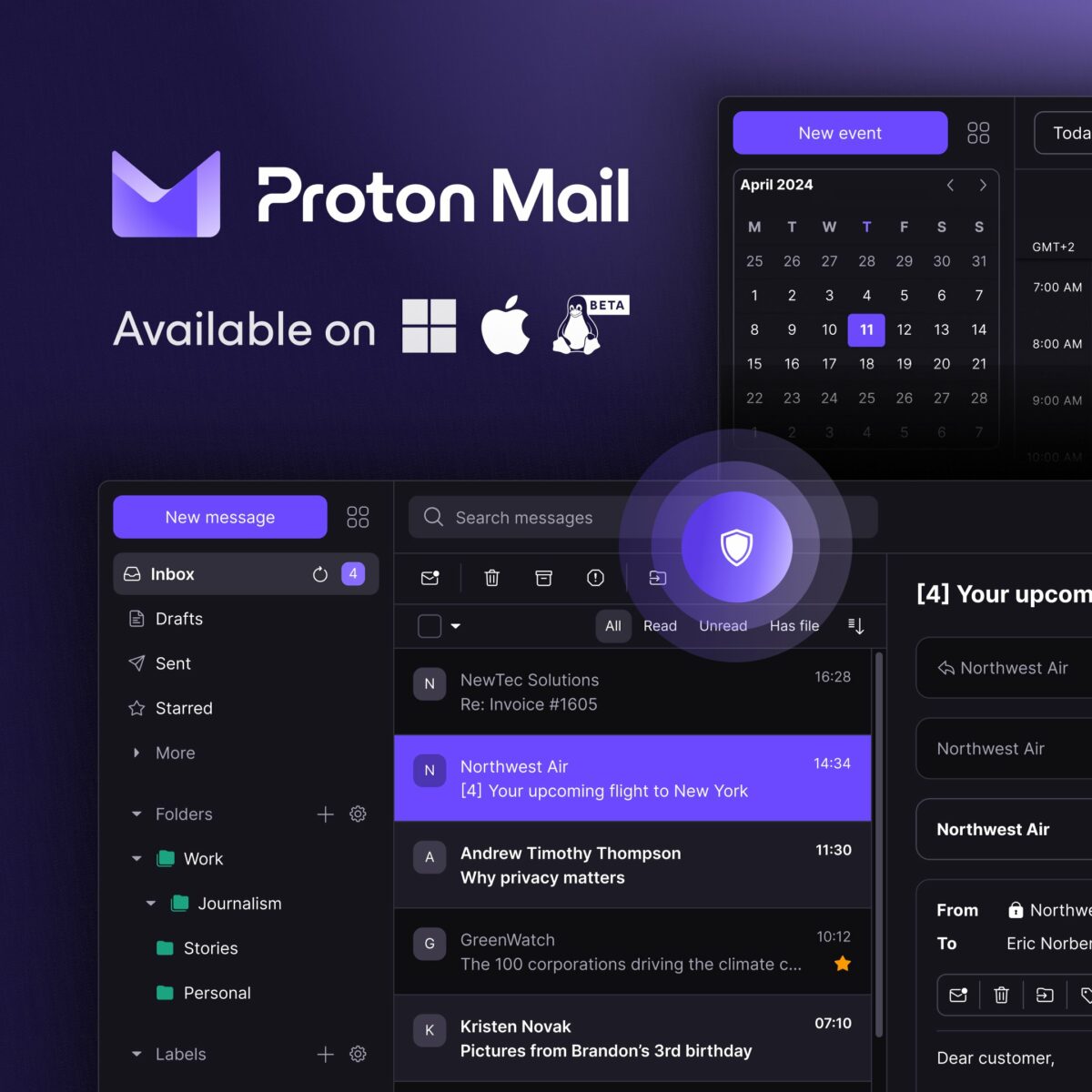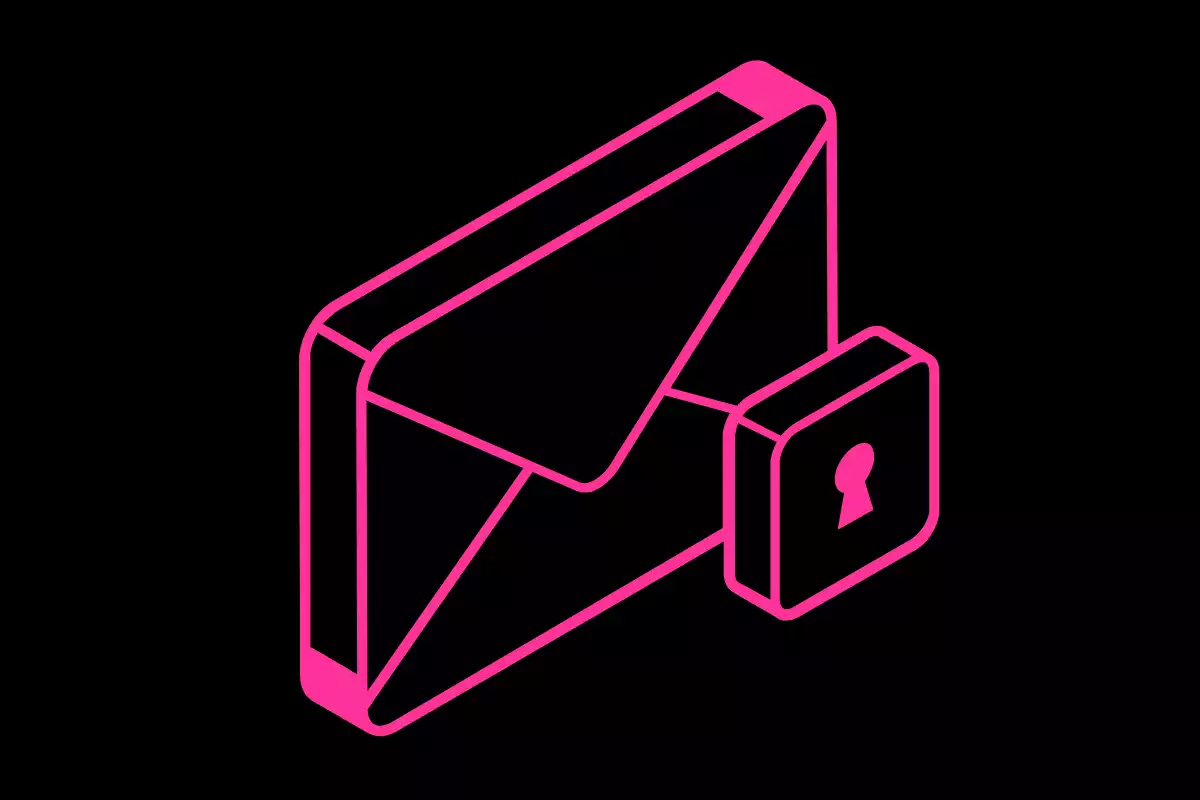Proton Mail has grown to become the email provider of choice for anyone who doesn’t want Big Tech snooping through their inbox. Here’s how it works in practice
There’s a good reason Google wants you to use Gmail for everything: tracking. It’s Google’s core business model. By tracking everything you do, Google can build more detailed user profiles which allows it to make more money with its advertising business.
Advertisers like details, the more specific the better. And Google has more information on you than anyone else, thanks to its stack of products that cover nearly every facet of your digital life.
Gmail is of central importance to this model, so if you want to anonymise yourself online – which isn’t a god-given right, for some reason – switching out Gmail for something more private is the way to go.
Here’s how Proton Mail compares to Tutanota (now known as Tuta), another popular privacy-focussed email platform.
One service has been leading the charge for secure email communication is Proton Mail. Launched in 2013 by a group of privacy-obsessed scientists, Proton Mail has grown to become the email provider of choice for anyone who doesn’t want Big Tech snooping through their inbox.
But with over 70 million users and counting, is Proton Mail still the gold standard for email security? Or has it become just another cog in the machine? Let’s cut through the cryptography and find out.
The Proton Mail Origin Story
It all started at CERN, the birthplace of the World Wide Web and apparently, email privacy. A group of scientists, fed up with the Orwellian reality of government surveillance, decided to take matters into their own hands.
Leveraging their expertise in particle physics and cryptography, they created Proton Mail – an email service that even they couldn’t read. After a wildly successful crowdfunding campaign and a few run-ins with the PayPal mafia, Proton Mail opened its doors to the public in 2016.
Since then, Proton Technologies AG, the company behind Proton Mail, has expanded its offerings to include a VPN, calendar, and cloud storage, all accessible under one Proton account. All from the privacy paradise of Switzerland.
Proton Mail’s Security Model

Proton Mail’s security isn’t just skin deep. They employ end-to-end encryption using OpenPGP, securing your emails before they even reach Proton’s servers. Even if a government agency came knocking, Proton Mail would have nothing to hand over.
And this did happen, in France. It sparked something of a controversy at the time; a privacy company handing over data to authorities is never a good look.
But this is more a symptom of our current reality than anything nefarious on the part of Proton. A company has to adhere to laws and requests from the state, just like anybody else. If you want a clearer overview of what actually happened, Andy Yen covered this in a Reddit AMA session.
One of the reasons privacy doesn’t really exist much online today is because there’s no competition. It doesn’t really matter how many privacy scandals Facebook has, right? At the end of the day, where else are you going to go? Who else are you going to get your services from? The FTC argued very strongly and correctly, in my mind, that once there was a lack of competition in this space, once Facebook had properly bought up all its competitors, it no longer needed to put emphasis on privacy, because it didn’t matter.
Andy Yen – Proton Founder
With privacy on Proton Mail, you have two-factor authentication, secure password reset via recovery email, and zero-access encryption, meaning Proton itself don’t have the keys to decrypt your emails, even if they wanted to.
For the truly paranoid, Proton Mail even offers a Tor onion site for maximum anonymity. Just don’t expect the UX to be pretty.
Using Proton Mail

So, what’s it like using Proton Mail on a daily basis? Surprisingly, not that different from your typical Gmail or Outlook setup.
Proton Mail’s webmail interface is clean, intuitive, and packed with features like custom domains, email filters, and contact management. Their mobile apps for iOS and Android are equally slick.
But here’s the catch – to truly unleash the power of Proton Mail, you’ll need to pony up for a paid plan. The free tier, while generous, limits you to 150 messages per day and 1GB of storage. For €4 per month, you can upgrade to Proton Mail Plus and kiss those limits goodbye.
The Proton Mail Ecosystem

Email is just the tip of the iceberg for Proton. Over the years, they’ve built out a full suite of privacy-focused tools, including Proton Calendar, Proton Drive, and Proton VPN.
While not as feature-rich as their Google counterparts (yet), Proton’s offerings are steadily improving. And with your Proton Mail account, you get seamless integration across all these services.
And is it completely open-source:
We support tens of millions of free Proton accounts in order to provide secure internet services to all, irrespective of one’s ability to pay. Our code and software libraries are open source and freely available, powering thousands of apps around the world that help defend freedom. Simply put, we believe that privacy is a fundamental human right for all.
Proton Mail
But let’s be real – you’re not choosing Proton Mail for its bells and whistles. You’re choosing it because you value your privacy. And on that front, Proton delivers in spades.
The Legal Side of Proton Mail
By setting up shop in Switzerland, Proton Mail benefits from some of the world’s strictest privacy laws. Unlike US-based providers, Proton Mail isn’t subject to the CLOUD Act or the PRISM program.
That doesn’t mean Proton Mail is above the law. They will comply with Swiss court orders, but even in those cases, the most they can hand over is account details and login history – never the contents of your emails.
For extra peace of mind, Proton Mail publishes regular transparency reports detailing any legal requests they receive. In 2020, they received 3,572 orders from Swiss authorities and contested 750 of them. Not too shabby.
The Future of Proton Mail

So, what’s next for Proton Mail? Judging by their recent product launches and acquisitions, quite a bit.
In 2022, Proton Mail acquired SimpleLogin, a privacy-focused email alias service. They’ve also been steadily improving their mobile apps and introducing new features like encrypted search and conversation view.
But perhaps most exciting is Proton’s foray into encrypted cloud storage with Proton Drive. Proton Drive is basically a secure, private alternative to the likes of Google Drive and Dropbox.
You can securely store all of your images and documents on it and no one, not Proton or anybody else, will be able to access and view the files.
Google Photos can literally recognise faces in your pictures. This is a cool feature of Google Photos but it is also very telling about just how sophisticated Google’s tracking features really are when you stop to think about what the end-game (beyond being a useful feature) actually is.
The Bottom Line

So, is Proton Mail the ultimate secure email solution? For my money, it’s damn close.
Let’s start with the elephant in the room – Proton Mail’s free tier. Yes, it’s limited. 150 messages per day and 1GB of storage might be enough for casual users, but if you’re running a business or just have a lot to say, you’ll hit those limits faster than a speeding neutrino.
And then there’s the lack of third-party integrations. If you’re used to plugging your email into every app and service under the sun, Proton Mail might feel like a walled garden. There’s no easy way to connect your Proton Mail account to your favorite CRM or productivity suite.
But here’s the thing – those limitations are by design.
Proton Mail’s primary focus is on privacy and security, and every decision they make is in service of that goal. By limiting the free tier, they ensure that their servers aren’t bogged down by spammers and bad actors. And by eschewing third-party integrations, they minimize the risk of data leaks and breaches.
Because when it comes to privacy and security, Proton Mail is very, very good.
End-to-end encryption? Check. Zero-access encryption? Check. Open source code? Check. Secure core architecture? Check. Proton Mail ticks all the boxes for what a truly secure email service should offer.
But more than that, Proton Mail has proven time and again that they’re willing to stand up for their users’ privacy, even in the face of legal pressure. They’ve fought court orders, resisted government overreach, and even had their entire service blocked in Russia for refusing to play ball with the Kremlin.
That’s the kind of commitment to privacy that you just don’t see from the big tech giants. Can you imagine Google or Microsoft going to bat for your privacy like that? I don’t think so.
So yes, Proton Mail has its limitations. But those limitations are a small price to pay for the peace of mind that comes with knowing your emails are truly private and secure. And in a world where data breaches and surveillance are the norm, that peace of mind is priceless.
I switched, paid the small premium, and I won’t be going back to Gmail.


